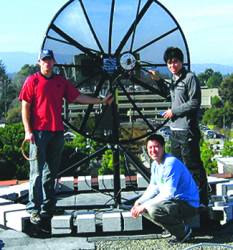Back in television’s halcyon days I should have been watching Donald Herbert explain science and technology on his Mr. Wizard programs.
But I was probably laughing my way through the Rocky & Bullwinkle Show instead, especially one of its mainstays, Fractured Fairy Tales — irreverent, yet revealing retellings of the Grimm Brothers’ homilies to human foibles.
And so I became a journalist instead of an engineer, hoping to fracture fallacies and received truths rather than oil shale.
Back in television’s halcyon days I should have been watching Donald Herbert explain science and technology on his Mr. Wizard programs.
But I was probably laughing my way through the Rocky & Bullwinkle Show instead, especially one of its mainstays, Fractured Fairy Tales — irreverent, yet revealing retellings of the Grimm Brothers’ homilies to human foibles.
And so I became a journalist instead of an engineer, hoping to fracture fallacies and received truths rather than oil shale.
Thus, every so often, I take a whack at some of the overarching ideas that affect and afflict a program I’ve chronicled for nearly a quarter century.
The examples here are aimed specifically at my own nation’s GNSS program — the U.S. Global Positioning System — but, more generally, elements of the same missteps can be detected in other systems as well.
Why bother, one might ask. What’s not to like about GPS? It’s free, it’s worked great — without failure, really — for nearly 20 years, and it has delivered to the world’s citizens an affordable, accurate, and available capability for precise location and timing unprecedented in human history.
Well, a few things come to mind.
Short-Term Thinking. I don’t recall anyone comparing GPS with Social Security; so, perhaps I can claim a first here. Two great programs, long in the making, on which millions have come to depend, and delivered at a bargain price. All they need is a little long-term commitment and an incremental boost in the rate of investment.
Scattered Governance. Many well-intentioned, intelligent, and hard-working people have broken their lances on managing GPS in a comprehensive, equitable, and far-sighted way. The latest incarnation of an interagency approach — the National Coordination Office for Space-Based PNT — is doing the best job yet, but more is needed. More budget, more authority, more respect. A new presidential directive is probably the place to start.
Begging Bowl Budgeting. This is a natural corollary to the previous topic. The tragedy of the commons is that no one person or family wanted to replenish the fields or mend the fences that fed everyone in the village. And so the departments of transportation and defense got responsibility for funding the system tacked on to their primary missions and agendas. That’s no way to get respect for a capability that everyone agrees is critical to the nation’s well-being.
Privatization of Public Resources. Spectrum auctions? A natural resource of physics that should be part of the national patrimony is treated with a gold-rush mentality. A drop in the bucket for deficit reduction, billions for the lucky bidders. How about managing radio frequency for the common good?
Magic of the Market. Remember, magic is mostly illusion, and that is what’s going on when we try to frame the core infrastructure needs of GNSS in marketplace terms. Pure distraction. Consider the experience of Globalstar and Iridium. They had the benefit of 20 years’ experience with GPS and Moore’s Law and still couldn’t make it on their own. Interstate highways, air traffic control, public education, and unemployment insurance programs have to be publicly funded or they’ll never last long enough to make money for the enterprises that depend on them. Try a voucher system for transportation and you build a bridge to nowhere.
We Don’t Need No Stinking Backup. And so it goes, despite an eight-year-old presidential directive to come up with one, demonstrated (and potentially catastrophic) risks of vulnerability, and an independent review team’s identification of at least one likely candidate — enhanced Loran. Others undoubtedly could be found, but we have to be willing to make it happen.
Confidence in System Security. Repeat after me: Nothing can go wrong, go wrong, go wrong. . . . Now turn to this issue’s cover feature beginning here.





